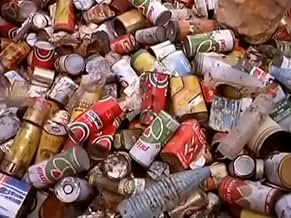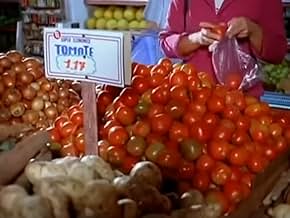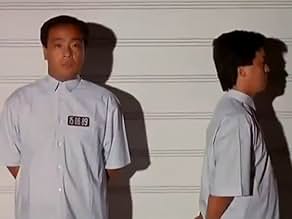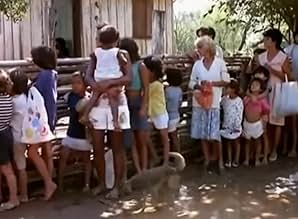Ilha das Flores
- 1989
- 13min
CALIFICACIÓN DE IMDb
8.5/10
6.9 k
TU CALIFICACIÓN
Agrega una trama en tu idiomaA tomato is planted, harvested, transported and sold in a supermarket, but it rots and ends up in the trash. The film follows it to its true end, all to make clear the difference between tom... Leer todoA tomato is planted, harvested, transported and sold in a supermarket, but it rots and ends up in the trash. The film follows it to its true end, all to make clear the difference between tomatoes, pigs, and human beings.A tomato is planted, harvested, transported and sold in a supermarket, but it rots and ends up in the trash. The film follows it to its true end, all to make clear the difference between tomatoes, pigs, and human beings.
- Dirección
- Guionistas
- Elenco
- Premios
- 4 premios ganados en total
- Dirección
- Guionistas
- Todo el elenco y el equipo
- Producción, taquilla y más en IMDbPro
Opiniones destacadas
10thbzcrt
That's the kind of movie you'll see quite by chance, one evening on television. And you will never forget it.
"Ilha das flores" is the story of a tomato, from the field where it is cultivated to the dustbin, and beyond. It's fun, and, at the same time, it tells you a lot about the economy and the Brazilian society. What is really unique for a documentary is that the story is as pleasant to follow as in a fiction, and the end is one of the more stunning and moving end I have ever seen in a movie.
"Ilha das flores" is the story of a tomato, from the field where it is cultivated to the dustbin, and beyond. It's fun, and, at the same time, it tells you a lot about the economy and the Brazilian society. What is really unique for a documentary is that the story is as pleasant to follow as in a fiction, and the end is one of the more stunning and moving end I have ever seen in a movie.
Not that I've seen a lot, of course. I caught this short in my documentary film class at the beginning of the semester. Unfortunately, I never saw another film better than this one. If you can find it, definitely check it out. The film says more about the human condition in fifteen minutes than most similarly themed films say in two hours. Devilishly humorous, the film hints along the way that there is more at stake than the running joke about a tomato would indicate. It's crucial to know as little as possible, so if you have a good independent video store nearby, seek it out and don't ask questions.
Here's a work that definitely proves how exciting and questioning a short movie picture can be.
Acting as a director, writer and producer, Jorge Furtado couragely aims a dazzling machinegun at issues as assorted as religion, Holocaust, Brazilian government, poverty, capitalism, and how human intelligence has been used throughout the ages.
Using a dialectical method, and narrating the story in a way that "even a Martian would understand", in the words of the author, the film forges a real cinematographical theorem of Brazilian deplorable situation, borrowing as the stage a neighbourhood in the city of Porto Alegre (one of Brazil's most developed ones, by the way). The degrading scenario, however, would apply to any community on the world in which the effects of money (or its lack) on the lives of its inhabitants are more visible.
In the movie's touching final take, Furtado destroys the bourgeois concept of Freedom, quoting a line from one of Brazil's greatest poetesses, Cecilia Meirelles, and leaves us wondering whether modern 'civilisation' is as far as the human intellect can take us.
Acting as a director, writer and producer, Jorge Furtado couragely aims a dazzling machinegun at issues as assorted as religion, Holocaust, Brazilian government, poverty, capitalism, and how human intelligence has been used throughout the ages.
Using a dialectical method, and narrating the story in a way that "even a Martian would understand", in the words of the author, the film forges a real cinematographical theorem of Brazilian deplorable situation, borrowing as the stage a neighbourhood in the city of Porto Alegre (one of Brazil's most developed ones, by the way). The degrading scenario, however, would apply to any community on the world in which the effects of money (or its lack) on the lives of its inhabitants are more visible.
In the movie's touching final take, Furtado destroys the bourgeois concept of Freedom, quoting a line from one of Brazil's greatest poetesses, Cecilia Meirelles, and leaves us wondering whether modern 'civilisation' is as far as the human intellect can take us.
The ironic, heartbreaking and acid "saga" of a spoiled tomato: from the plantation of a "Nisei" (Brazilian with Japanese origins); to a supermarket; to a consumer's kitchen to become sauce of a pork meat; to the garbage can since it is spoiled for the consumption; to a garbage truck to be dumped in a garbage dump in "Ilha das Flores"; to the selection of nutriment for pigs by the employees of a pigs breeder; to become food for poor Brazilian people.
Today I have had the chance to see "Ilha das Flores", one of the first works of Jorge Furtado, one of or maybe my favorite Brazilian director in the present days. With a perfect logic, and a pace of video clip, Jorge Furtado exposes the wild Brazilian capitalism, where there are two countries: for those that can afford, and for the millions of miserable that are below a pig in the hierarchy of disputing garbage. This documentary is a devastating and overwhelming social critic to our modern society and may be seen as a funny satire by foreigners, but unfortunately reflects the sad reality of my country. Mandatory masterpiece! My vote is ten.
Title (Brazil): "Ilha das Flores" ("Isle of Flowers")
Today I have had the chance to see "Ilha das Flores", one of the first works of Jorge Furtado, one of or maybe my favorite Brazilian director in the present days. With a perfect logic, and a pace of video clip, Jorge Furtado exposes the wild Brazilian capitalism, where there are two countries: for those that can afford, and for the millions of miserable that are below a pig in the hierarchy of disputing garbage. This documentary is a devastating and overwhelming social critic to our modern society and may be seen as a funny satire by foreigners, but unfortunately reflects the sad reality of my country. Mandatory masterpiece! My vote is ten.
Title (Brazil): "Ilha das Flores" ("Isle of Flowers")
10jordani
Jorge Furtado needed no more than 13 minutes to prove his theory "there's no God", showed in the beginning of the movie. This movie is as raw as fresh meat and cuts like a knife. No more words to describe. You must see it for yourself. Believe me, after you watch this movie you won't forget it never more.
¿Sabías que…?
- TriviaThe short opens with three short sentences on screen: "Este filme não é um filme de ficção. Existe um lugar chamado Ilha das Flores. Deus não existe." [This film is not a work of fiction. There is a place named Island of Flowers. God does not exist.]
- ConexionesFeatures Nazi Concentration Camps (1945)
Selecciones populares
Inicia sesión para calificar y agrega a la lista de videos para obtener recomendaciones personalizadas
Detalles
- Fecha de lanzamiento
- País de origen
- Idioma
- También se conoce como
- Isle of Flowers
- Locaciones de filmación
- Ilha das Flores, Porto Alegre, Río Grande del Sur, Brasil(30º 12' 30" S, 51º 11' 21" W)
- Productora
- Ver más créditos de la compañía en IMDbPro
- Tiempo de ejecución13 minutos
- Mezcla de sonido
- Relación de aspecto
- 1.37 : 1
Contribuir a esta página
Sugiere una edición o agrega el contenido que falta

Principales brechas de datos
By what name was Ilha das Flores (1989) officially released in Canada in English?
Responda



















